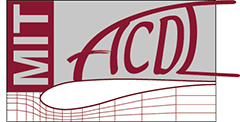Abstract:
We present the adaptive Direct FEM Simulation methodology for time-resolved simulation of aerodynamics without any turbulence or wall model parameters. We directly from first principles solve conservation of momentum with incompressibility and a slip boundary condition representing small friction at high Reynolds number, giving predictive capability for new configurations. The mesh is automatically constructed to satisfy an error bound by goal-oriented adaptive error control, based on solving the time-dependent adjoint problem by the same stabilized method. We introduce a numerical tripping noise term to act as a seed for growth of perturbations, The software implementation is automated from input of the formulkation mathematical notation in the open source Unicorn/FEniCS framework by code generation and symbolic differentiation.
To validate the methodology we have participated in the High Lift Prediction Workshops, representing the highest level of open benchmarking. We show that the methodology quantitavely and qualitatively captures the main features of the full aircraft JSM experiment - aerodynamic forces and the stall mechanism, with 10x faster and cheaper computation than the state of the art methods and software in the field, and with convergence under mesh refinement by the adaptive method. Thus, the simulation methodology appears to be a possible answer to the NASA Vision 2030 challenge of reliably predicting turbulent-separated flows for a complete air vehicle.
We also present recent comparison against leading high-order frameworks in connection to the 5th International Workshop on High Order CFD Methods, showing that adaptivity and large timesteps enables high computational efficiency. The methodology is further extended to two-phase flow and fluid-structure interaction with an embedded discontinuity in the phase interface by doubling the solution field, and we show a snapshot of the development.
The open source Unicorn/FEniCS framework with the standard NACA0012 benchmark is made available in a pedagogic and user-friendly setting as part of the online course MOOC-HPFEM which has attracted 10000+ participants, with a web-based HPC interface enabled by the MSO4SC framework.
We are interested in extending the open source distributed-memory 3D adaptive framework in Unicorn/FEniCS to coarsening and transient adaptivity, and we identify the open source Omega_h library as an interesting candidate for providing the required low-level operations. Collaboration around such development is of great interest, as well as general method and open source development and comparison in open benchmarking.

